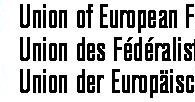The European Bureau of the UEF, meeting in Brussels on June 4th, 2011
takes note that:
– national governments faced the financial crisis with partial and inadequate policies creating the image of a European Union divided among virtuous countries and profligate countries, without considering that in a Monetary Union, with many countries with different problems of growth, it is inevitable that the weak national economies are unable to face the competition of the global market;
– national governments reacted to the Arab springtime with fears, more worried by the immigration wave than by the need to show what a united Europe could do for the future of the Arab peoples; and when they decided to help Libya’s rebels with military means, they showed to the world how divided and weak Europe is;
– the EU is facing a deep crisis because the national governments have lost of sight the final goal of European integration singled out by the founding fathers: a Federal Europe;
– the oblivion of the European goal is the main cause of the spread of populism and euroscepticism in several countries and the reckless revolt of young and unemployed people against a EU incapable to understand their hopes and their needs;
persuaded that
with the active participation of European citizens, the political revival of the European federal goal is possible
demands:
– to the European parties in the European Parliament
a) to support the Haug-Lamassoure-Verhofstadt project “Europe for Growth” which proposes to substitute all national contributions to the EU budget with European own resources (coming from a percentage of the VAT, a carbon tax, a tax on financial transactions) and a plan for public investments of 1% of GDP, financed by the EIB with the issues of project eurobonds, in order to promote the growth of the European economy, create new jobs and a sustainable development;
b) to support the Duff’s proposal for a European election reform, in order to create a single European constituency to favour a debate among the main political European leaders on the future of the EU and enhance citizens’ participation;
c) in view of the European election of 2014, to put in their program a clear proposals for a European growth policy, the creation of a federal budget, a federal foreign policy and a federal government; moreover they should announce who is their candidate to the Presidency of the European Commission before the European election;
– to national governments:
a) to stop their short-sighted veto’s policy against the increase of the European budget; the main wastage of public finances comes form national budget, which finances expenses for public goods, such as military defence, which can be cheaply and more efficiently provided with a single EU defence policy;
b) to exploit the Lisbon Treaty to gather a group of countries favouring the creation of a federal budget and a federal foreign policy;
– to European citizens, civil society organisations and political parties to support an action in favour of a European growth policy joining a network for a European citizens’ initiative.


Follow the comments: |
|
